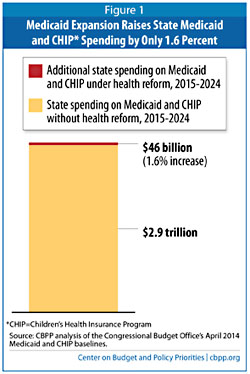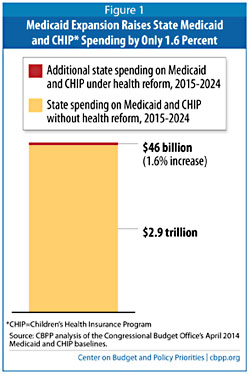
 Need some more good news on Obamacare? How about some mixed news instead? Here it is:
Need some more good news on Obamacare? How about some mixed news instead? Here it is:
Congressional Budget Office (CBO) estimates released last week show that health reform’s Medicaid expansion, which many opponents wrongly claim will cripple state budgets, is an even better deal for states than previously thought….CBO now estimates that the federal government will, on average, pick up more than 95 percent of the total cost of the Medicaid expansion and other health reform-related costs in Medicaid and the Children’s Health Insurance Program (CHIP) over the next ten years (2015-2024).
The good news is obvious: the Medicaid expansion is an even better deal for states than we thought. The federal government will pick up nearly the entire cost of expansion, and when you account for money that states will save from reduced amounts of indigent care and greater help with mental health costs, the net cost of expansion gets very close to zero.
The mixed nature of this seemingly good news comes from the reason for CBO’s more optimistic budget projection: it’s because they think the program will cover fewer people than they previously projected. There had always been a fear among states that lots of people who were already eligible for Medicaid—but had never bothered applying for it—would hear the Obamacare hoopla and “come out of the woodwork” to claim benefits. Since these folks weren’t technically part of the expansion, states would be on the hook to cover the bulk of their costs.
CBO now believes this fear was overblown. Apparently most people who didn’t bother with Medicaid before Obamacare took effect aren’t going to bother with it now either. That’s good for state budgets, but obviously not so good for all the people who could be getting medical care but aren’t.
For what it’s worth, this is a tradeoff we’re going to see a lot of. Unless the actual cost of medical care comes down, the budget impact of Obamacare is always going to depend on how many people benefit from it. If lots of people sign up, that’s good for public health but costly for taxpayers. If fewer people sign up, then government spending goes down but fewer people receive medical care. There aren’t very many ways around this iron law.















